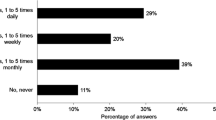Abstract
Background Pharmacists can play a key role in managing ailments through their primary roles of supplying over-the-counter (non-prescription) medicines and advice-giving. It must be ensured that pharmacy staff practise in an evidence-based, guideline-compliant manner. To achieve this, mystery shopping can be used as an intervention to assess and train pharmacy staff. Objective To determine if repeated student pharmacist mystery shopping with immediate feedback affected the outcome of scenarios requiring referral to a medical practitioner. To determine what, if any, factors may influence whether referral occurred. Setting Thirteen community pharmacies across metropolitan Sydney, Australia. Methods Sixty-one student pharmacist mystery shoppers visited 13 community pharmacies across metropolitan Sydney once weekly over nine weeks between March–October 2015 to conduct audio-recorded mystery shopping visits with assigned scenarios (asthma, dyspepsia, diarrhoea). Students returned to the pharmacy immediately to provide staff members with feedback. Pharmacy staff were scored by mystery shoppers according to a standardised scoresheet. Score data and other characteristics, such as the assigned scenario, were analysed via correlation and logistic regression modelling. Main outcome measure Whether a student mystery shopper was appropriately referred to a medical practitioner based on the presenting symptoms. Results 158 visits were eligible for analysis. Referral to a medical practitioner was appropriately made in 66% of visits. The regression model provided an R2 value of 0.73; the questioning score of the interaction and if a pharmacist was involved in the interaction were significant predictor of appropriate outcome (p < 0.001 and p < 0.01 respectively). Statistically significant differences were found between median questioning and total scores of interactions involving a pharmacist compared to those that did not (p < 0.001). No statistically significant correlation was found between the number of visits and appropriate outcome (p > 0.05). Conclusions Mystery shopping with feedback did not improve pharmacy staff performance over time. Increased questioning and involvement of a pharmacist in the interaction were significant predictors of referral to a medical practitioner occurring.
Similar content being viewed by others
References
Veiga P, Lapão LV, Cavaco AM, Guerreiro MP. Quality supply of nonprescription medicines in Portuguese community pharmacy: an exploratory case study. Res Social Adm Pharm. 2015;11(6):880–90.
Smith FJ. Referral of clients by community pharmacists in primary care consultations. Int J Pharm Pract. 1993;2(2):86–9.
Paudyal V, Watson MC, Sach T, Porteous T, Bond CM, Wright DJ, et al. Are pharmacy-based minor ailment schemes a substitute for other service providers? Br J Gen Pract. 2013;63(612):472–81.
Watson MC, Cleland JA, Bond CM. Simulated patient visits with immediate feedback to improve the supply of over-the-counter medicines: a feasibility study. Fam Pract. 2009;26(6):532–42.
Bosse N, Machado M, Mistry A. Efficacy of an over-the-counter intervention follow-up program in community pharmacies. J Am Pharm Assoc. 2012;52(4):535–40.
O’Brien MA, Rogers S, Jamtvedt G, Oxman AD, Odgaard-Jensen J, Kristoffersen DT, et al. Educational outreach visits: effects on professional practice and health care outcomes. Cochrane Database Syst Rev. 2007;4:CD000409.
Benrimoj SI, Werner JB, Raffaele C, Roberts AS. A system for monitoring quality standards in the provision of non-prescription medicines from Australian community pharmacies. Pharm World Sci. 2008;30(2):147–53.
Werner JB, Benrimoj SI. Audio taping simulated patient encounters in community pharmacy to enhance the reliability of assessments. Am J Pharm Educ. 2008;72(6):136.
Xu T, de Almeida Neto AC, Moles RJ. A systematic review of simulated-patient methods used in community pharmacy to assess the provision of non-prescription medicines. Int J Pharm Pract. 2012;20(5):307–19.
Berger K, Eickhoff C, Schulz M. Counselling quality in community pharmacies: implementation of the pseudo customer methodology in Germany. J Clin Pharm Ther. 2005;30(1):45–57.
Neto AC, Benrimoj SI, Kavanagh DJ, Boakes RA. Novel educational training program for community pharmacists. Am J Pharm Educ. 2000;64(3):302.
Yu F, de Almeida Neto AC, Moles RJ. Improving children’s cough and cold management in community pharmacies—a simulated caregiver study. Sydney: The University of Sydney; 2014.
Kelly FS, Williams KA, Benrimoj SI. Does advice from pharmacy staff vary according to the nonprescription medicine requested? Ann Pharmacother. 2009;43(11):1877–86.
Xu T, de Almeida Neto AC, Moles RJ. Simulated caregivers: their feasibility in educating pharmacy staff to manage children’s ailments. Int J Clin Pharm. 2012;34(4):587–95.
Pharmaceutical Society of Australia. Standards for the provision of pharmacy medicines and pharmacist only medicines in community pharmacy. In: Professional practice standards. Canberra: Pharmaceutical Society of Australia; 2006. http://www.psa.org.au/download/standards/s2s3-standards.pdf. Accessed 7 April 2017.
Schneider CR, Everett AW, Geelhoed E, Padgett C, Ripley S, Murray K, et al. Intern pharmacists as change agents to improve the practice of nonprescription medication supply: provision of salbutamol to patients with asthma. Ann Pharmacother. 2010;44(7–8):1319–26.
Watson MC. Factors predicting the guideline compliant supply (or non-supply) of non-prescription medicines in the community pharmacy setting. Qual Saf Health Care. 2006;15(1):53–7.
Watkins K, Wood H, Schneider CR, Clifford R. Effectiveness of implementation strategies for clinical guidelines to community pharmacy: a systematic review. Implement Sci. 2015;10:151.
Benrimoj SI, Werner JB, Raffaele C, Roberts AS. A system for monitoring quality standards in the provision of non-prescription medicines from Australian community pharmacies. Pharm World Sci. 2007;30(2):147–53.
de Almeida Neto AC, Benrimoj SI, Gomel M, Fois R. Inappropriate self-medication practices: a pharmacy-based intervention. J Soc Adm Pharm. 1996;13:131–8.
Acknowledgements
The authors wish to acknowledge all of the Bachelor of Pharmacy students and the pharmacy staff who participated in this study.
Funding
This study was funded by the Australian Government Office for Learning and Teaching (Grant No. SD14-4207); the Pharmacy Council of New South Wales (Grant No. G176927); and Alphapharm Pty Ltd (Grant No. G176862).
Author information
Authors and Affiliations
Corresponding author
Ethics declarations
The authors have no conflicts of interest to declare.
Electronic supplementary material
Below is the link to the electronic supplementary material.
Rights and permissions
About this article
Cite this article
Collins, J.C., Schneider, C.R., Faraj, R. et al. Management of common ailments requiring referral in the pharmacy: a mystery shopping intervention study. Int J Clin Pharm 39, 697–703 (2017). https://doi.org/10.1007/s11096-017-0505-8
Received:
Accepted:
Published:
Issue Date:
DOI: https://doi.org/10.1007/s11096-017-0505-8



